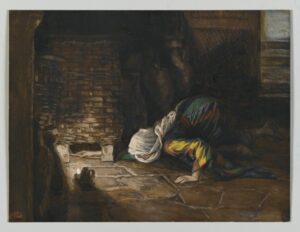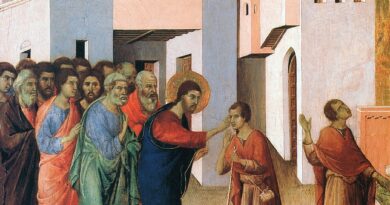XXIVth Sunday of Ordinary Time
Massimo Palombella

In today’s Gospel (Lk 15:1-32) Jesus tells the famous parable of the merciful Father in which we are shown the true identity of the Christian God.
The existential understanding of the true God is a slow journey that, if authentic, inevitably leads us to the knowledge of ourselves. The image of God that we encode in our existence is substantially conditioned by our ancestral relationships. We may perceive God as distant, unreachable, vindictive, unconcerned about us, always ready to judge us. And it is precisely in relation to our perception of God that we encode a kind of personal ‘religiosity’ where, for example, we must atone, always live up to it, be careful not to offend God, deprive ourselves of the finer things in order to have God’s benevolence.
Jesus offers us the possibility of slowly freeing ourselves from all this, which weighs so heavily on us and consumes our best energies. The God he reveals to us goes absolutely “beyond” our ancestral unsolved issues and is able to lead us “beyond” the prisons they impose on us.
The Christian God desires us, he waits for us every day scanning the horizon, he runs towards us “beyond” all our weaknesses, he waits for us precisely in our “unresolved” to heal us and lead us “beyond”, towards the persons we can, should and are called to be.
The Offertory antiphon of today’s celebration is taken from Chapter 32 of the book of Exodus (Ex 32:11-14) with the following text:
“Precatus est Moyses in conspectu Domini Dei sui, et dixit:
Quare, Domine, irasceris in populo tuo?
Parce irae animae tuae; memento Abraham, Isaac, et Jacob,
quibus jurasti dare terram fluentem lac et mel.
Et placatus est Dominus de malignitate, quam dixit facere populo suo.”
(Moses prayed to the Lord his God, and said;
Moses addressed this prayer to the Lord his God, and declared:
Why, O Lord, is your anger enkindled against your people?
Let the wrath your mind has conceived cease. Remember Abraham, Isaac and Jacob,
to whom you swore to give a land flowing with milk and honey.
And the Lord was dissuaded from accomplishing the evil which he had threatened to inflict upon his people).
The attached music, in Gregorian Chant, is taken from the Graduale Triplex published in Solesmes in 1979.
The interpretation is by the “Nova Schola Gregoriana” conducted by Luigi Agustoni. The music track can be found on the CD “Gaudete in Domino” published in 2015 by “Casa Musicale Eco” (https://youtu.be/e6iI4ncmfck)
A blessed Sunday and heartfelt greetings.

